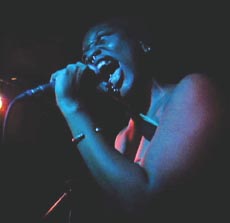First-time film-maker James Spooner presented his racially charged documentary ‘Afro-Punk: The rock and roll nigger experience’ in Dana auditorium on Dec. 1. WQFS and Blacks Unifying Society (BUS) coordinated the screening and the Q&A session Spooner hosted after the film. Afro-Punk examines the life-styles of young black adults who define themselves as punks. Using interviews with musicians and scene-makers from across the United States, Spooner examines how a variety of black punks fit into a predominantly white sub-culture.
Wisely, he stays behind the camera throughout the movie and still manages to give Afro-Punk a highly personal touch; it’s no surprise that the writer, director, editor and producer also lived the lifestyle he documents.
Spooner is a self-taught cinematographer, and his inexperience with film-making is sometimes apparent. Still, Afro-Punk’s DIY style, while technically unappealing, works within the framework of the movie to give it a punk-rock touch. The effect is augmented by an 80+ cast and frantic soundtrack.
Afro-Punk introduces several memorable characters: Mariko Jones, an upper middle class woman from Southern California who edits her own ‘zine; Matt Davis, who sings in a hardcore band from New York; and black nationalist and punk-rocker Moe Mitchell.
At its best, the film manages an assault on mainstream black and white American culture. The viewer is made to understand that the identities of black people are largely shaped by corporate America. Punk rock, Spooner asserts, frees humans from the corporate system.
Spooner most effectively makes his points by splicing in clips of black people answering questions about their identity and the problems they face as punks. Many times, very different people answer a question in nearly the same words, proving that racial identity problems are systemic in our culture.
Unfortunately, he doesn’t examine how mainstream society shapes the identities of many young black people or clearly define what it is about the mainstream he so aggressively opposes. At times, Afro-Punk feels like a public-service announcement from the underground. Interesting social questions are eclipsed by too many scenes that show kids trying to prove how punk-rock they are. One extended sequence gives us a Cribs-style visit to a “punk house,” in which the residents are sitting around bragging about being poor.
After the movie, Spooner took questions from the audience that helped explain his reasons for making Afro-Punk. Spooner admitted his film was aimed at a black audience. He also said he hoped the film will reach enough younger black viewers to change their perception of what it means to be black in America.
He then told a story about two teenagers who came up to him on the subway and started making fun of his style because it did not conform to the mainstream.
The mainstream media, Spooner asserted, is largely responsible for this type of ignorance. He claimed that if Afro-Punk were shown on MTV for a few months, black people would think a punk-rock lifestyle was not only acceptable but cool.
Thus, Spooner created Afro-Punk, not to explain why punk-rock exists but rather to offer black youth an alternative to a homogenized mainstream culture.
But if we are to look at Afro-Punk as a recruitment video aimed at black audiences, then it is almost certainly a failure. The people Spooner interviews seem angry, confused, and baffled about their identities. Furthermore, they are misunderstood by both black and white people.
In one awkward scene we see Davis, the hardcore band-leader, singing a song about slavery to an all-white, all-male audience. The fans have memorized the songs’ lyrics but in interviews after the show can’t explain its meaning.
Jones, the ‘zine editor who lives in an expensive suburban neighborhood, describes how black people she knows ostracize her for “selling out” and “acting white.” In the Q&A session, Spooner claimed that in many places, the black community is less tolerant of black punks than the white community.
If he had devoted more of the film to the problems mainstream culture faced, Spooner could have made the punk lifestyle look both more appealing and more important. The audience would be forgiven for leaving the film imagining that punk rock is simply about being different for the sake of being different.
Afro-Punk might have worked better if Spooner had a clear goal in mind when creating the film. He seems to be making two movies at once: one about black people who choose to define themselves as punk, why they do it, and how they fit into the punk-rock sub-culture; and one that de-constructs the myth of being black in contemporary America. Both are interesting topics, but neither idea is explored enough to answer the audience’s questions.

